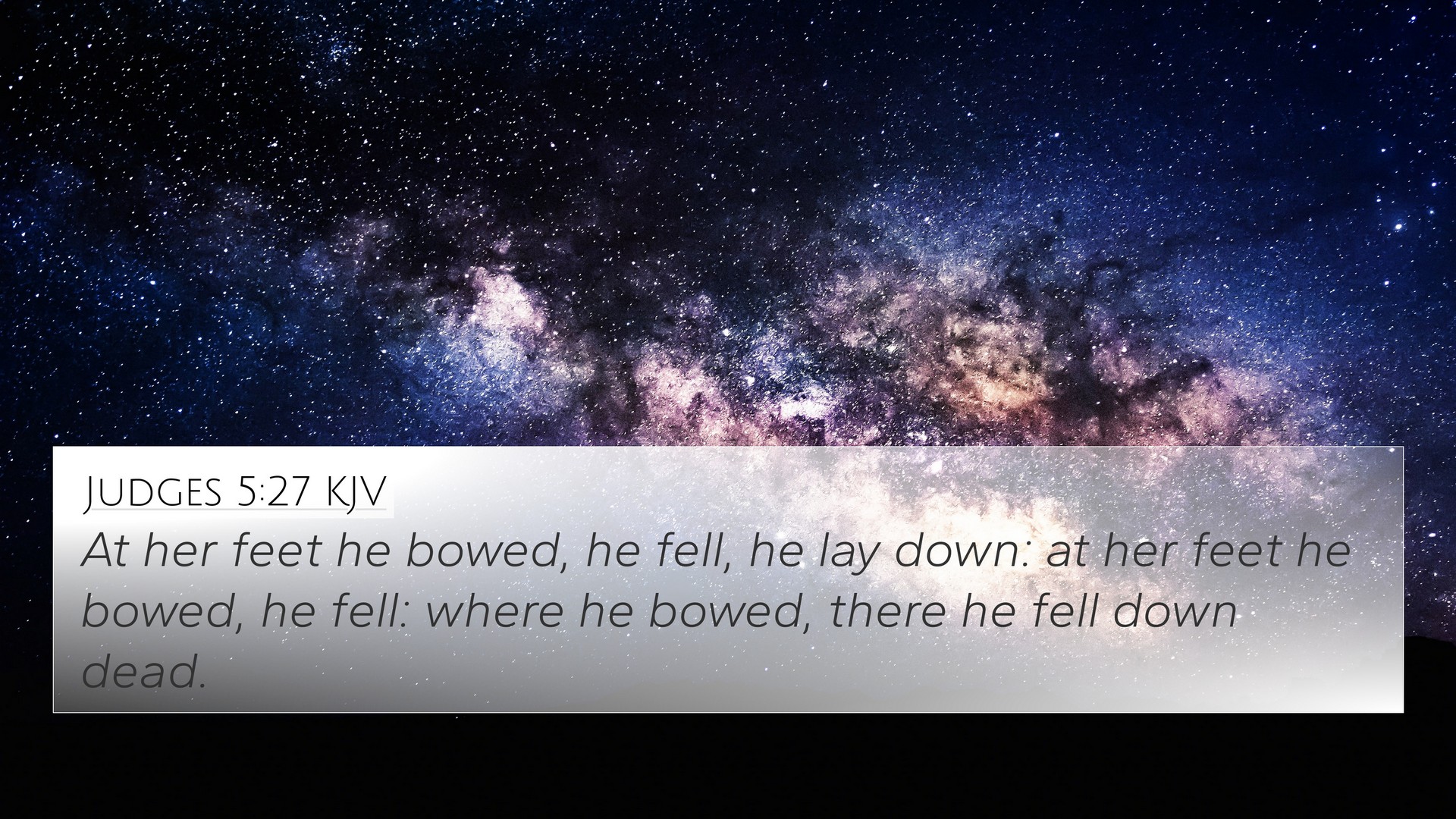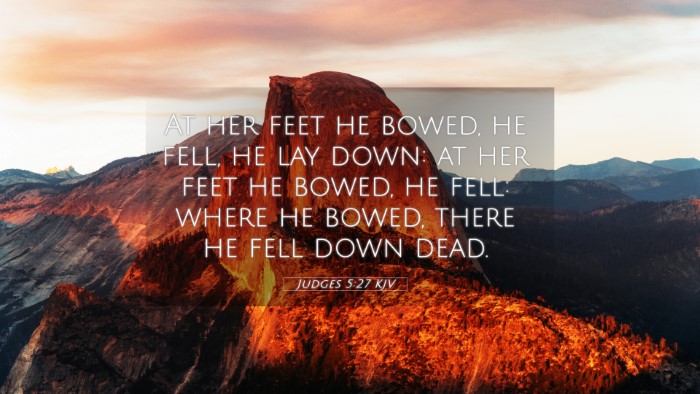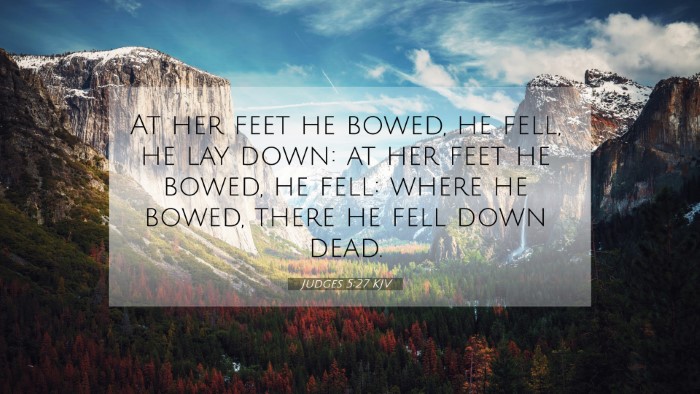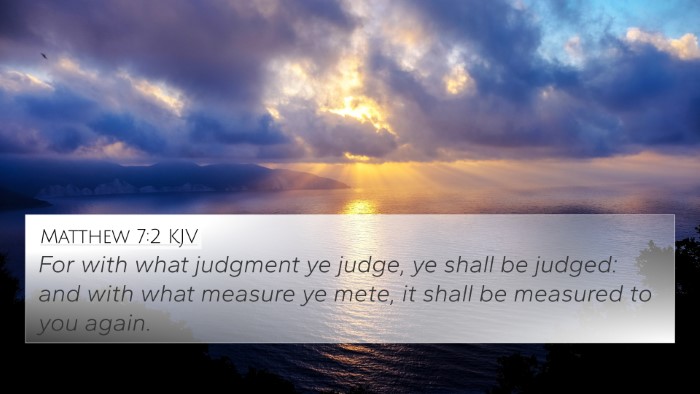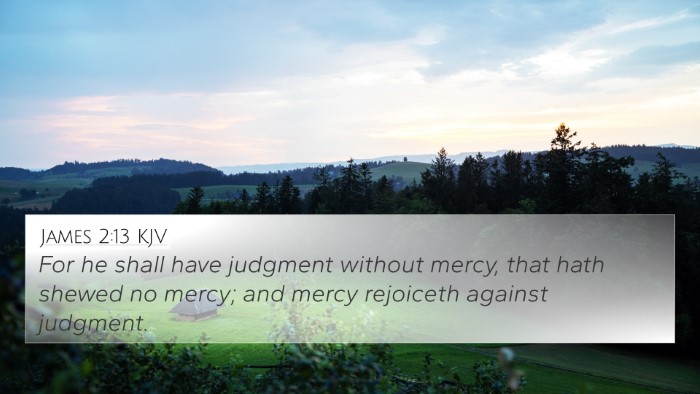Understanding Judges 5:27
This verse is part of the Song of Deborah, celebrating the victory of Israel over its enemies. Judges 5:27 states:
"At her feet he bowed, he fell, he lay down; at her feet he bowed, he fell: where he bowed, there he fell down dead."
The surrounding verses characterize the triumph of God's people and the heroic acts of the leaders like Jael, who kills the foe Sisera. Let’s delve into the meaning and significance of Judges 5:27 combined from various public domain commentaries.
Context of Judges 5:27
This verse echoes the events of a battle led by Deborah and Barak against the Canaanite army. Sisera, the commander of this army, had been defeated, and Jael's actions were a pivotal part of this victory.
Commentary Insights
-
Matthew Henry's Commentary:
Matthew Henry draws attention to the dramatic imagery in this verse, emphasizing Sisera's ultimate downfall before Israel. His repeated falling signifies not just defeat in battle, but also spiritual humiliation before the living God. The repetition portrays a stark image of his helplessness against divine providence.
-
Albert Barnes' Commentary:
Albert Barnes provides a historical context of how the events unfold in this chapter. He notes that Sisera's fate was sealed by the hand of a woman, which signifies the breaking of traditional expectations. Barnes emphasizes God's sovereignty in using unexpected means to achieve victory, demonstrating that victory does not always align with human expectations.
-
Adam Clarke's Commentary:
Adam Clarke focuses on the poetic structure of Deborah's song. He highlights that Sisera's kneeling is an act of total submission, even in death. Clarke also reflects on the subtext of divine retribution, illustrating a broader theme of God’s justice against those who oppose His chosen people.
Thematic Connections
This verse connects deeply with various themes found throughout the Scriptures, including:
- Divine justice
- Victory through faith
- God's control over human affairs
Bible Cross-References
Several cross-references shed light on the broader narrative and its implications:
- Exodus 14:13-14: God promises to fight for Israel, resonate with the assurance of deliverance in Judges.
- Psalm 46:10: "Be still, and know that I am God." Reflects the theme of divine intervention.
- Hebrews 11:32-34: Mentions Deborah and victory through faith, aligning with the victory in Judges.
- Isaiah 10:33-34: God cuts down the Assyrians, paralleling the fate of Sisera.
- Romans 12:19: "Vengeance is mine, I will repay," echoing God’s hand in justice.
- 1 Corinthians 1:27: God often uses the weak to confound the strong, evident in Jael’s act.
- Philippians 2:10: Every knee shall bow, reminiscent of Sisera's final submission.
- 2 Samuel 2:10: The decline of Saul’s kingship mirrors Sisera's fall.
- Revelation 19:1-2: Celebration of judgment connects to the victorious songs sung by Deborah.
- James 4:10: Humbling oneself before God as Sisera faced his fate.
Inter-Biblical Dialogue
Judges 5:27 invites further inquiry into how themes of submission, victory, and divine justice resonate across both the Old and New Testaments. In these interactions, we see a rich tapestry that showcases God’s relentless pursuit of His people and the triumph of divine intervention over human opposition.
Final Thoughts
Judges 5:27 encapsulates a moment where pride met its demise under divine will. The verse serves as a reminder of God's sovereignty, illustrating that those who oppose His purposes will ultimately be vanquished, irrespective of their earthly power. As we explore the connections between Bible verses, it becomes clear that the narrative of God's leadership and justice is consistent and profound throughout scripture.
Utilizing tools for Bible cross-referencing can enhance understanding and provide more contextual insights. For practitioners of scriptural study, knowing how to generate these cross-references leads to a deeper appreciation of the text and its applications today. By studying these connections, one gains a more comprehensive understanding of God’s word and His workings within our lives.
In conclusion, the study of Judges 5:27 and its associated commentaries enriches our understanding of scriptural narratives and inspires further exploration of the Bible’s interconnected teachings.
